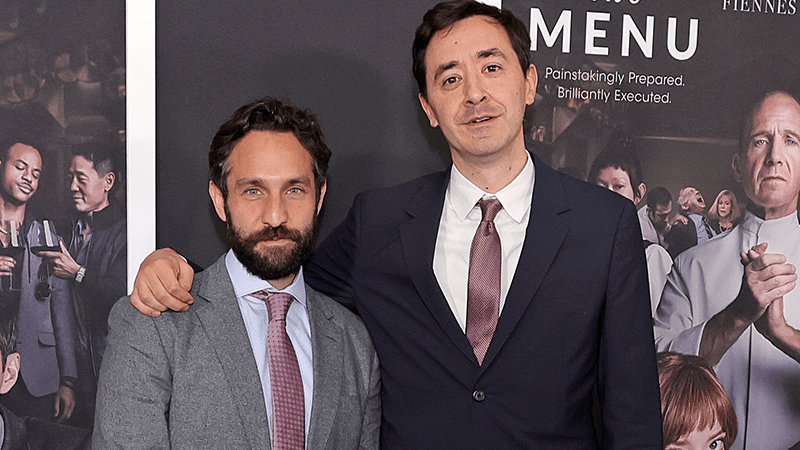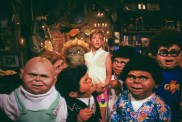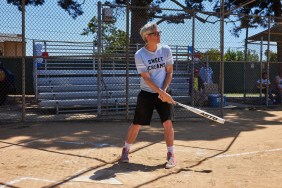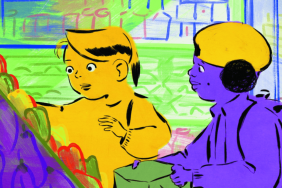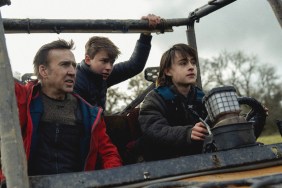ComingSoon spoke with The Menu writers Will Tracy and Seth Reiss about balancing drastically different tones and their experiences with fine dining. The Menu is currently playing in theaters.
“A young couple travels to a remote island to eat at an exclusive restaurant where the chef has prepared a lavish menu, with some shocking surprises,” reads the film’s synopsis.
Jonathan Sim: This is such an interesting and well-written movie. I wanted to ask, what are the movies and shows that served as your inspirations when you were writing the script for this film?
Will Tracy: A big one that we shared with the director, Mark Mylod, is Robert Altman’s Gosford Park. I think it’s similarly trying to put you into a very specific cultural context with a very specific type of person. Then you’re kind of moving around a social situation, catching bits of story from an ensemble and piecing together a narrative from snatches of conversations at a dinner, basically. So that was one initial inspiration.
Seth Reiss: Yeah, I think that’s a good one.
Tell me a bit more about working with Mark Mylod. What was it like to collaborate with him and bring your screenplay to life with him?
Seth Reiss: That was good. Will has worked with Mark on Succession, but we sent the script to Mark, and he read it, [and] we met with him. He really enjoyed it. Basically, the cool thing about Mark was he immediately saw how he was going to blend all the tones in the movie, and it didn’t seem to him like a puzzle piece of how to do that. Then what was great was Mark had us on set for the entire shooting of the movie, which is kind of rare for movie writers to be on set. So we were there for the entire shooting of the movie. We were sitting in Video Village. We would give notes whenever it seemed appropriate. We would go out on set and give actors alt lines, and we were talking to the actors a lot. Then we watched cuts with him. So it was a very collaborative, lovely experience, and we always have such high respect for Mark, that he allowed us to do that.
This movie balances a bunch of different tones. Given that there’s so much going on beneath the surface of the film, how would you describe the themes of The Menu? What were you trying to say with the film?
Seth Reiss: One thing we wanted to talk about was maybe of entitlement and just how we tend to consume and consume and consume and consume content kind of mindlessly and inhale it kind of mindlessly. We don’t really take a moment to think about how hard it is to produce that content and to be thankful for the people who do produce it. Then on the other end of that, if your job is providing that content, accepting that that is also what your job is. But that doesn’t mean that if you’re consuming the content, you shouldn’t be appreciative of the people providing it for you. I think that’s one of the themes that we were …
Will Tracy: Yeah, exactly. We’re in a culture now where food is considered art and, therefore, content. You have to accept the fact that you’re then sort of entering into a transactional relationship with the culture, right? So everyone in that dining room, in some way, has something to gain reputationally or financially from the restaurant, right? There’s the foodie whose whole identity is wrapped up in this idea of the restaurant. There’s the critic whose status depends on being the arbiter, the decider of what is good and what is not good. There’s the investors who are eating dinner that night who actually have a financial stake in the restaurant. So it’s a really a whole ecosystem of people who are part of this culture of consumption — content consumption. Yeah, I guess making people aware of being a part of that culture.
Are there any standout moments in the film that you’re particularly excited for audiences to experience?
Seth Reiss: There’s two, for me. One is where the story really takes a turn. I like how it’s kind of a slow burn until that moment. And then there’s a moment where —
Will Tracy: We’re trying to be vague about details so we don’t spoil anything.
Seth Reiss: Yeah, and then there’s a moment where one of the main characters has to cook. I think that moment, for me, and that sequence is saying a lot because “you’re obsessed with us. Well do it. You talk about it all the time, do it, and you can’t.” So I very much enjoy what we’re getting out of that sequence.
Are there any Easter eggs in the film that you’re hoping that audience pick up on, or little hidden details in there?
Seth Reiss: Well, it definitely takes place in the DC Universe. Everyone has a Joker card under their seat.
Will Tracy: The island is directly off of Gotham City harbor, of course.
Seth Reiss: If people stay through the film at the end of the credits, you just hear (Joker laugh).
Will Tracy: To answer your question, I think we tried to structure the film in a way where there was quite a bit of overlapping dialogue from other tables that you might not catch on the first run because I think we wanted it to feel very alive in that dining room. So we felt like there was truly something interesting and conversational happening at every table. A lot of that was stuff that doesn’t even make it in the movie, but we’re just telling the actors, giving them suggestions for what they could be talking about their table while we’re on someone else’s coverage. There’s quite a bit of dialogue that kind of makes it in on the margins of the sound mix, that hopefully will reward repeat viewings.
Seth Reiss: Also, an Easter Egg, purely for me, is that one of the tech guys’ name is Bryce. I went to high school with a guy named Bryce, who’s a very good friend of mine, and the last name of the guy who presents the course, Louden … Bryce dated a girl with the last name Louden. So there you go. That’s a very specific answer that’ll probably not mean much. Very specific.
This film has had a very successful run at TIFF and is coming out soon, what do you hope that an audience is going to take away from this film?
Seth Reiss: I guess I hope they take away two things. Very fun, funny time at the movie theater. I think they’ll see that it’s a very fun movie to — I’ve watched it in groups like six times now. It’s always been fun. And then, I do hope that then they’ll see the next several levels of the things that we’ve talked about in this conversation. I hope that comes through for them. I hope that maybe they’ll be kind of shocked and weirded out and interested in what they just saw, and they’ll want to talk about it a little bit more when they leave the theater.
Will Tracy: I think when you choose a really specific location, a really a specific cultural area to set a film in like this — a high end tasting menu, high dollar restaurant — yeah, some part of you wishes or hopes that anyone who sees the movie and then in their own life goes to a restaurant like that … that every time they eat a restaurant, they’re going to think about this movie, this experience. It will have some sort of … people who are scared to go to the beach again after seeing Jaws. It’ll have some sort of resonance with them. That’s always a hope.
When you write, I feel like one of the most common things to do is to imagine what it’s going to look like, who could play the characters on screen. So I wanted to ask, are there any actors or directors who you would be really excited to work with in the future?
Seth Reiss: Oh God. I mean, there’d be so many actors and directors would be excited to work with in the future, but you know, what I think is true [is] the people that it makes sense to work with on a specific project end up being the correct people. So on The Menu, [it] made sense for it to be Mark directing, it made sense for Ralph [Fiennes] to be the main character. It just all … I think by the time you start shooting something, all these things congeal into what it’s supposed to be. Even though you might have dreamed of working with this person or that person or that person, it will only work if it makes sense for that communal creative experience to happen. And if you try to force it, it won’t be right.
Will Tracy: That’s right. Alluding to what Seth said earlier about Mark was not puzzled by the script. I’m sure there are some really great auteur directors who might read the script and not really quite know how to juggle … thinking, “how do you mix the comedy with the thriller elements?” I think Mark never mentioned that stuff. I think he understood how to do that. So yeah, you eventually match with the person who you’re supposed to match with. hopefully. In our case, that certainly came true. To answer your question more specifically, yeah. There’s tons of people we’d like to work with. A lot of our favorite people write their own stuff. So it’s tricky, right?
Seth Reiss: Yeah, but if Francis Ford Coppola wants to something that we’ve written, we’re in!
Will Tracy: If he decides for the first time to not direct his own script, Paul Thomas Anderson, please give us a call.
Given how incredible this was, I feel like you guys are going to have a successful screenwriting career going forward. Are there any types of genres that you’re currently passionate about making?
Will Tracy: Genres is a good question. We usually don’t think in terms of genres, we think terms of like “what’s a world or a subculture or very specific character type or character flaw that we’d like to examine?” But yeah, if I had to do a genre thing, the two that I love would be — whether it’s high-end, low-end, realistic, unrealistic — I love spy stuff. Anything where they’re jetting around the European continent with like fake passports. I like that kind of thing. And then, there’s no market for it anymore, but I’ve always wanted to do a Western. But there’s not really any market for it.
Seth Reiss: But then there always ends up being a Western. There’s no market for it and people don’t make this, and then all of a sudden there’s like a Western and it’s good. There’s another Western. Western would be really fun.
What is the most high-end dish that you have ever tried or want to try?
Will Tracy: One specific dish? It would probably have to be something that a lot of these restaurants will have on a tasting menu. One of the courses will say “supplement with truffles.” Where you pay an extra $80 on top to have like shaved fresh black truffles.
Seth Reiss: Well, not 80, the places we’re talking about are probably 300. Then you have people like Ina Garten where it makes no difference. They all taste the same.
Will Tracy: “I’m already paying hundreds of dollars, to pay even more just for one course to get some truffles or something, what am I doing?” So I’ve never really done that, but I’ve seen people do that.
Seth Reiss: I think for me, I can’t tell you a dish, but I know that Alinea in Chicago was an amazing experience. Well, I would say well worth the money. Something that I will remember for the rest of my life. So what couldn’t be worth money?
Will Tracy: Because we don’t eat at this kind of restaurant a lot, but for special occasions we have. They’re not all great. They taste really good, but they can be quite punishing to be like for three, four hours. Then sometimes the food comes out quite slowly and in small portions and you feel both really full by the end, but yet not satisfied because you never really got to savor something. It’s just little bits that come and go. So when you find a place that does it beautiful, like Alinea, and everything comes out exactly when you’re ready for the next thing to come out, and every dish feels like a reaction to the last one or a showstopper in some way … it is pretty special when you see it happen.
